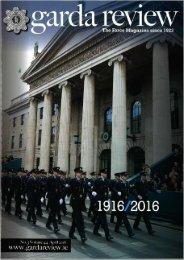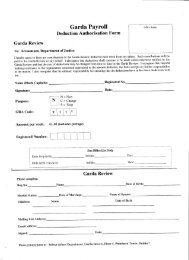Conference Report 2016
Table of contents contains links on page 5. It can be used to skip through chapters.
Table of contents contains links on page 5. It can be used to skip through chapters.
Create successful ePaper yourself
Turn your PDF publications into a flip-book with our unique Google optimized e-Paper software.
Section 3: Sub-committee <strong>Report</strong>s<br />
wElfARE<br />
We are all concerned by the evident increase over recent<br />
years of the number of our colleagues who have taken<br />
their own lives. Many of us have been directly affected<br />
by these tragedies and some have been involved in the<br />
consequential investigations that result. While the<br />
Central Statistics Office cannot supply data on suicide<br />
rates by occupation, it is apparent that the number of<br />
members of An Garda Síochána who have committed<br />
suicide is high when compared to figures for the general<br />
population in the relevant age group. It is of particular<br />
concern that the trend has increased dramatically in this<br />
organisation while it is downward in the general<br />
population.<br />
The Welfare Committee have liaised with Dr Claire Hayes,<br />
consultant clinical psychologist, Clinical Director with<br />
AWARE and author of several books on stress and<br />
coping. Dr Hayes agrees with this Association’s call for a<br />
Wellbeing Survey of members to be undertaken. She is<br />
also of the view that all professional supports for<br />
individuals with mental health issues or potential issues<br />
should be easily accessed and without bureaucratic<br />
delays.<br />
We have also met with the National Office for Suicide<br />
Prevention (NOSP), which was set up in 2005 within the<br />
HSE to provide support for the implementation of a<br />
national suicide prevention strategy. NOSP maintain that<br />
effective suicide prevention strategies “must be rooted<br />
in robust data about the risk and protective factors<br />
affecting particular population groups. Identifying what<br />
groups are vulnerable to suicidal behaviour and trying to<br />
identify what puts them at risk and what can help to<br />
protect them is essential in designing effective<br />
responses” NOSP have identified a list of priority groups<br />
based on analysis of information available to them<br />
consisting of evidence of vulnerability to and increased<br />
risk of suicidal behaviour. Occupational groups identified<br />
were healthcare professionals and those working in<br />
isolation (vets, farmers) NOSP agree that our figures are<br />
cause for concern. They have a helpful websiteyourmentalhealth.ie<br />
which provides a wide range of<br />
useful information.<br />
As mentioned above and in last year’s report we are<br />
calling for a wellbeing/stress survey to be conducted and<br />
await a decision. It is worth recalling that the last such<br />
survey among our members was in 1998. This was<br />
conducted for this Association by the Department of<br />
Applied Psychology, NUI, Cork. It was noted in the<br />
Executive Summary of this study -<br />
“An examination of stress in occupations such as<br />
policing seems particularly important. In any<br />
organisation, high levels of stress would be a source for<br />
concern, but it seems all the more important given that<br />
the work of police officers may impinge on the safety,<br />
wellbeing, liberty and even life of other individuals in<br />
society.”<br />
The case for conducting such a survey is compelling and<br />
organisations such as the Health and Safety Authority,<br />
The European Agency for Safety and Health at Work,<br />
World Health Organisation, International Labour<br />
Organisation, Chartered Institute of Personnel and<br />
Development, Labour Relations Commission et al, are all<br />
advocates.<br />
We have called for a Wellbeing section on the Garda<br />
Portal. This could provide advice and information on the<br />
hazards of work related stress, shift work, diet, nutrition,<br />
exercise, substance abuse, addiction, sleep, general<br />
health and mindfulness. Links to other relevant agencies<br />
websites (NOSP for example) should be included. This<br />
type of support is available to many employees in the<br />
private and public sector many of whom are involved in<br />
lower risk employments than our members.<br />
We call for the information required by Section 9.1 of the<br />
Working Time Agreement (HQ Directive 3/13) to be made<br />
readily available –<br />
“9.1 Medical advice shall be provided by the Chief Medical<br />
Officer in self-care and health management arising from<br />
the obligation to perform shift work.”<br />
In June 2015 the Minister for Health, Mr Leo Varadkar and<br />
the Government signed off on the Health and Wellbeing<br />
(Workplace Wellbeing) Bill which if enacted will require<br />
public service employers to develop a ‘healthy<br />
workplace’ policy to promote the physical, mental and<br />
social wellbeing of employees. Employers and employees<br />
will be able to decide for themselves what initiatives to<br />
pursue. We believe that An Garda Síochána should not<br />
wait for legislation and should prioritise the development<br />
of such a policy in collaboration with representative<br />
associations.<br />
“Trends and Patterns in Occupational Health and Safety<br />
in Ireland” was a major study undertaken by a research<br />
steering group comprising the Economic and Social<br />
Research Institute and Health and Safety Authority<br />
published in May 2015. Among its findings are that- “the<br />
38th Annual Delegate <strong>Conference</strong><br />
5




